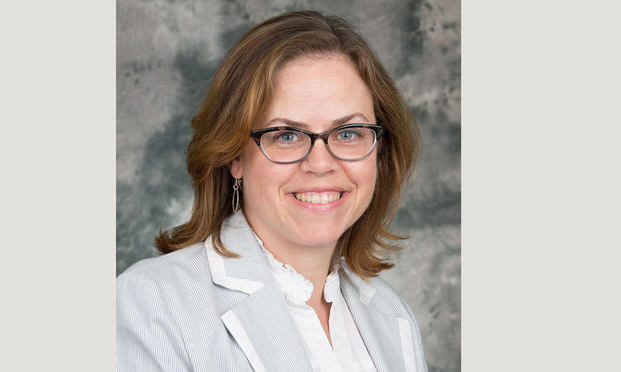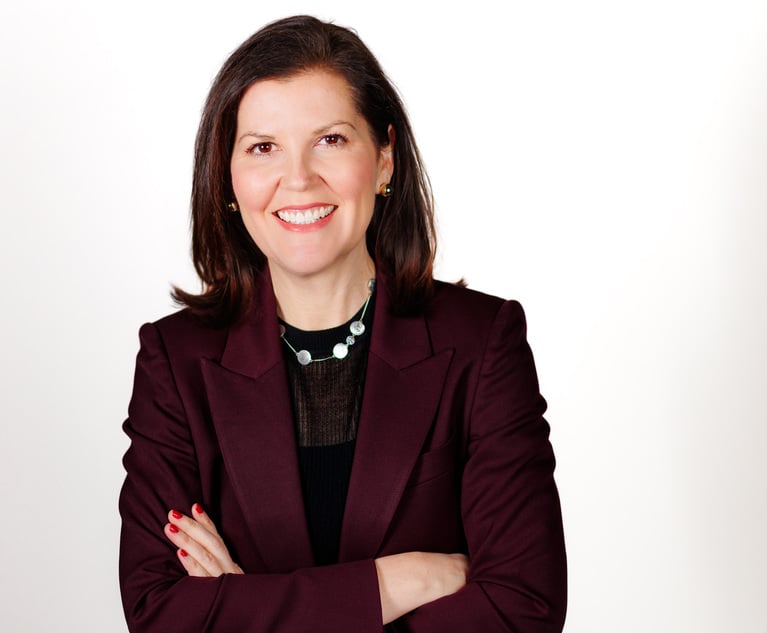New Report Says Manufacturers Can Expect More Suits on Energy Projects, Climate Change, Privacy and Data Security
Manufacturers in 2019 are likely to see continued attacks on their energy infrastructure projects, more climate change litigation, and a steady stream of liability actions over data privacy and hacking incidents, according to a new report from the in-house lawyers at the National Association of Manufacturers.
March 18, 2019 at 07:17 PM
4 minute read
 Linda Kelly, senior vice president and general counsel of the National Association of Manufacturers.
Linda Kelly, senior vice president and general counsel of the National Association of Manufacturers.
Manufacturers in 2019 are likely to see continued attacks on their energy infrastructure projects including pipelines, more climate change litigation, and a steady stream of liability actions over data privacy and hacking incidents. That's according to the first ever litigation report from the in-house lawyers at the National Association of Manufacturers.
The report also includes the group's litigation and amicus wins in 2018, along with a look at ongoing litigation and amicus projects. The report was published by NAM's legal arm, the Manufacturers' Center for Legal Action.
Linda Kelly, the group's senior vice president and general counsel, said the most significant litigation win last year was its 9-0 victory in National Association of Manufacturers v. U.S. Department of Defense in the U.S. Supreme Court over a jurisdictional issue that had delayed legal challenges to the Environmental Protection Agency's 2015 “Waters of the United States” Rule.
“We'd been involved in the case for a long time, and it was a very high-profile engagement for us,” Kelly said. “This is the first time a case carrying the NAM name has come before the court.”
She said resolving the jurisdictional issue “was a very time-saving and illuminating outcome for a wide variety of cases in a number of places.” The victory cleared the path for the group to move forward with its lawsuit seeking to invalidate the rule in the U.S. District Court for the Southern District of Texas. A decision is expected in the next few months.
Kelly said other cases that loom significantly this year—and in which the center has filed or will file amicus briefs—include appeals in two climate change cases, where plaintiffs seek to apply “public nuisance” tort liability on manufacturers that are allegedly contributing to global warming.
The cases are important, she said, because the public nuisance theory could be expanded to any industry over any popular issue, such as lead paint, agricultural chemicals or even McDonald's hamburgers in obesity litigation.
“It's like a super tort,” Kelly said, “so broad that it could swallow up all other product liabilities claims. If that happens, it is open season on manufacturers.”
The other case Kelly finds especially consequential for manufacturers this year is the U.S. Supreme Court's review of a doctrine called “Auer deference.” The doctrine allows agencies to give extreme deference to a federal agency's interpretation of its own rules.
“So much of our litigation centers on whether or not a federal agency has the authority to do what it did,” Kelly explained. “To have the court actually provide some additional direction and potentially narrow the deference would be significant.”
The report also highlights the center's Manufacturers' Accountability Project and the Manufacturers' Compliance Institute. The accountability project was formed to help battle the climate change suits, and so far it has a perfect 3-0 record in court cases.
The Compliance Institute won the regional Association of Corporate Counsel's 2018 In-House Innovator Award. The institute provides free legal and regulatory compliance guidance to NAM members, through partnerships with six top-tier law firms.
The law firms include Sidley Austin for environmental issues; Littler Mendelson on labor and employment law; Wiley Rein on intellectual property; Shook, Hardy & Bacon on product safety; Squire Patton Boggs for international issues; and Crowell & Moring on California Proposition 65, a ballot initiative on toxic chemical use.
One participant in the free calls is Littler employment law attorney Michael Lotito. He said many of the calls come from members at smaller companies that may not even have an in-house counsel. “It's usually about fundamental compliance issues in labor law,” Lotito explained, although occasionally a case's facts may be rather complex.
Drawing more members than the individual calls, he said, are useful webinars that offer new developments on labor issues.
The report said last year the institute answered 64 member requests for compliance assistance, and hosted five webinars that served over 1,000 members.
This content has been archived. It is available through our partners, LexisNexis® and Bloomberg Law.
To view this content, please continue to their sites.
Not a Lexis Subscriber?
Subscribe Now
Not a Bloomberg Law Subscriber?
Subscribe Now
NOT FOR REPRINT
© 2025 ALM Global, LLC, All Rights Reserved. Request academic re-use from www.copyright.com. All other uses, submit a request to [email protected]. For more information visit Asset & Logo Licensing.
You Might Like
View All
Ex-Marathon General Counsel Takes Legal Reins of Another Energy Company

GC With Deep GM Experience Takes Legal Reins of Power Management Giant
2 minute read
Jenner & Block Energy Practice Leader Joins Renewable-Power Giant Constellation as GC

Nation's Largest Utility Parts Ways With CLO Who Helped It Navigate Bribery Scandal
Trending Stories
- 1Uber Files RICO Suit Against Plaintiff-Side Firms Alleging Fraudulent Injury Claims
- 2The Law Firm Disrupted: Scrutinizing the Elephant More Than the Mouse
- 3Inherent Diminished Value Damages Unavailable to 3rd-Party Claimants, Court Says
- 4Pa. Defense Firm Sued by Client Over Ex-Eagles Player's $43.5M Med Mal Win
- 5Losses Mount at Morris Manning, but Departing Ex-Chair Stays Bullish About His Old Firm's Future
Who Got The Work
J. Brugh Lower of Gibbons has entered an appearance for industrial equipment supplier Devco Corporation in a pending trademark infringement lawsuit. The suit, accusing the defendant of selling knock-off Graco products, was filed Dec. 18 in New Jersey District Court by Rivkin Radler on behalf of Graco Inc. and Graco Minnesota. The case, assigned to U.S. District Judge Zahid N. Quraishi, is 3:24-cv-11294, Graco Inc. et al v. Devco Corporation.
Who Got The Work
Rebecca Maller-Stein and Kent A. Yalowitz of Arnold & Porter Kaye Scholer have entered their appearances for Hanaco Venture Capital and its executives, Lior Prosor and David Frankel, in a pending securities lawsuit. The action, filed on Dec. 24 in New York Southern District Court by Zell, Aron & Co. on behalf of Goldeneye Advisors, accuses the defendants of negligently and fraudulently managing the plaintiff's $1 million investment. The case, assigned to U.S. District Judge Vernon S. Broderick, is 1:24-cv-09918, Goldeneye Advisors, LLC v. Hanaco Venture Capital, Ltd. et al.
Who Got The Work
Attorneys from A&O Shearman has stepped in as defense counsel for Toronto-Dominion Bank and other defendants in a pending securities class action. The suit, filed Dec. 11 in New York Southern District Court by Bleichmar Fonti & Auld, accuses the defendants of concealing the bank's 'pervasive' deficiencies in regards to its compliance with the Bank Secrecy Act and the quality of its anti-money laundering controls. The case, assigned to U.S. District Judge Arun Subramanian, is 1:24-cv-09445, Gonzalez v. The Toronto-Dominion Bank et al.
Who Got The Work
Crown Castle International, a Pennsylvania company providing shared communications infrastructure, has turned to Luke D. Wolf of Gordon Rees Scully Mansukhani to fend off a pending breach-of-contract lawsuit. The court action, filed Nov. 25 in Michigan Eastern District Court by Hooper Hathaway PC on behalf of The Town Residences LLC, accuses Crown Castle of failing to transfer approximately $30,000 in utility payments from T-Mobile in breach of a roof-top lease and assignment agreement. The case, assigned to U.S. District Judge Susan K. Declercq, is 2:24-cv-13131, The Town Residences LLC v. T-Mobile US, Inc. et al.
Who Got The Work
Wilfred P. Coronato and Daniel M. Schwartz of McCarter & English have stepped in as defense counsel to Electrolux Home Products Inc. in a pending product liability lawsuit. The court action, filed Nov. 26 in New York Eastern District Court by Poulos Lopiccolo PC and Nagel Rice LLP on behalf of David Stern, alleges that the defendant's refrigerators’ drawers and shelving repeatedly break and fall apart within months after purchase. The case, assigned to U.S. District Judge Joan M. Azrack, is 2:24-cv-08204, Stern v. Electrolux Home Products, Inc.
Featured Firms
Law Offices of Gary Martin Hays & Associates, P.C.
(470) 294-1674
Law Offices of Mark E. Salomone
(857) 444-6468
Smith & Hassler
(713) 739-1250






